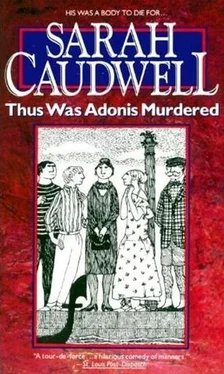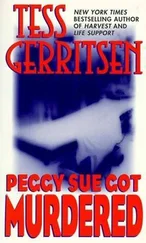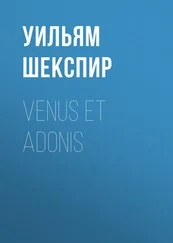Sarah Caudwell - Thus Was Adonis Murdered
Здесь есть возможность читать онлайн «Sarah Caudwell - Thus Was Adonis Murdered» весь текст электронной книги совершенно бесплатно (целиком полную версию без сокращений). В некоторых случаях можно слушать аудио, скачать через торрент в формате fb2 и присутствует краткое содержание. Жанр: Иронический детектив, на английском языке. Описание произведения, (предисловие) а так же отзывы посетителей доступны на портале библиотеки ЛибКат.
- Название:Thus Was Adonis Murdered
- Автор:
- Жанр:
- Год:неизвестен
- ISBN:нет данных
- Рейтинг книги:5 / 5. Голосов: 1
-
Избранное:Добавить в избранное
- Отзывы:
-
Ваша оценка:
- 100
- 1
- 2
- 3
- 4
- 5
Thus Was Adonis Murdered: краткое содержание, описание и аннотация
Предлагаем к чтению аннотацию, описание, краткое содержание или предисловие (зависит от того, что написал сам автор книги «Thus Was Adonis Murdered»). Если вы не нашли необходимую информацию о книге — напишите в комментариях, мы постараемся отыскать её.
Thus Was Adonis Murdered — читать онлайн бесплатно полную книгу (весь текст) целиком
Ниже представлен текст книги, разбитый по страницам. Система сохранения места последней прочитанной страницы, позволяет с удобством читать онлайн бесплатно книгу «Thus Was Adonis Murdered», без необходимости каждый раз заново искать на чём Вы остановились. Поставьте закладку, и сможете в любой момент перейти на страницу, на которой закончили чтение.
Интервал:
Закладка:
“Miss Larwood,” I said, “is not a schoolgirl, but an intelligent and sophisticated woman who has been for several years in practice at the Bar.” This statement is perfectly true — I cannot really see what there is about it to make it seem so peculiarly misleading.
The Vice-Quaestor found English inadequate to express his answer. There was a rather sharp exchange of Italian before Graziella translated it.
“The Vice-Quaestor is of the opinion,” she said, “that it is just such a woman, a woman who has known nothing of love but has lived the cold life of the intellect, such a woman, when she believes that at last she has found happiness, who would respond with particular violence when she found she had been deceived. You must understand, Signor Shepherd,” she added, looking coldly at the police officer, “that when the Vice-Quaestor refers to happiness he means marriage — that, in the opinion of the Vice-Quaestor, is the greatest happiness that any woman could hope for.”
“Yes, I see,” I said. “And was there something further?”
“The Vice-Quaestor has also invited me to tell you that if the little Signorina Julia were to admit quite frankly, as he says, that that was what happened the Court would no doubt be very sympathetic. I have explained, however, to the Vice-Quaestor that the little Signorina Julia is a very nice girl, a very kind-hearted girl, who likes to please people, but she is not so foolish as to admit to a crime she has not committed in order to play even a most sympathetic part in the drama which he has invented.”
I nodded. It did not seem prudent to offer a different account of Julia’s character from that at present entertained by the Vice-Quaestor. A man who sees life in operatic terms no doubt divides women into the virtuous, who will commit murder for the sake of their honour, and the wicked, who will do so for no reason at all. I suggested instead that if the crime were thought to be one of passion it was surely more probable that Kenneth Dunfermline, whose relationship with the victim seemed to have been more intimate than that of a mere travelling companion—
“No, Signor Shepherd,” said the police officer. And even Graziella shook her head.
It was at this stage that I learnt for the first time the exact circumstances in which the crime was discovered. Since Marylou has already given you a full account, there is no point in my repeating it — what she told you seems to be exactly the same as she told the police and it was confirmed, of course, by her husband and Kenneth Dunfermline. Well, it established, as you know, that Dunfermline is out of it.
It was rather a setback: I had been quite optimistic about persuading the police that he was the most likely person to have committed the crime. Still, though he and the Americans were excluded from suspicion, there were any number of other people who would have had the opportunity.
“No, Signor Shepherd,” said the Vice-Quaestor again.
It was at this point that things began to be difficult. What made them so was the evidence of the chambermaids. There are, apparently, four chambermaids. Their rooms are on the second floor of the annexe; but in the afternoons, instead of resting there, they prefer to sit in the entrance-way, talking and enjoying the sunshine. On Friday afternoon, they settled down as usual just after lunch — that is to say, about quarter past two — and remained there until dusk, when they dispersed to turn down the beds. From time to time one or another of them would have been briefly absent, making coffee and so forth; but there were always at least three of them there.
Questioned on Saturday morning by the Vice-Quaestor, they were all prepared to swear that the only people who had entered or left the annexe during that time were the following: Julia and Ned, going into the annexe together a few minutes after they themselves had settled down there; Julia, leaving again at about quarter past six; Mrs. Frostfield, who returned at about seven; and Major Linnaker, who arrived shortly afterwards. They had not actually seen the return of the other Art Lovers; but it was only a minute or two after they had dispersed that one of them was asked by Marylou to unlock the door to the room shared by Ned and Kenneth and so became a witness to the discovery of the crime.
I have no doubt that they are all charming girls; but I did rather wish there had not been so many of them. I pointed out, however, that they had been taking, by their own account, something in the nature of a siesta. In the heat of the afternoon, it would have been natural for them to become drowsy. There would surely have been several occasions when someone waiting for an opportunity to slip unnoticed into the annexe—
“No, Signor Shepherd,” said the Vice-Quaestor, becoming, I felt, repetitive. He had questioned them closely about this possibility and they had been sure that none of them had slept — they had been taking it in turns to read aloud from a book which they found most interesting.
“Ah well,” I said indulgently, “if they were deeply absorbed in some romantic novel—”
The book which had engaged their attention was not, as it turned out, a romantic novel: it was The Origin of the Family, Private Property and the State by Friedrich Engels.
“Two of them are graduates,” said the Vice-Quaestor, spreading his hands in a gesture of despondency. “What can one expect?” He went on to make one or two further comments, which I thought injudicious, on the higher education of women. They provoked a rather heated response, in Italian, from Graziella — for the next ten minutes I was quite unable to follow the conversation, which appeared to cover a wide range of political and economic issues. At the end of it the Vice-Quaestor looked more despondent than ever.
“I am sorry, Signor Shepherd,” said Graziella, “you have not come here to talk about the difficulties of our poor country — you were saying?”
“I was saying,” I said, “that if these girls were deeply absorbed in a work of political philosophy—”
But it was no use. Interested as they were in their reading, they might not have noticed anyone who simply came on to the bridge and returned to the terrace; but they were physically so disposed about the entrance-way to the annexe that no one could have entered it without disturbing them.
“Of course,” I said, “we have been considering only the orthodox means of access. It would have been possible, I suppose, for someone travelling by boat along the canal to climb up to one of the balconies and to leave by the same route? The bedrooms of such a hotel as the Cytherea must present an attractive target for robbery.”
Physically, the Vice-Quaestor agreed, it was a possibility: but only, of course, under cover of darkness — and the murder had been discovered a mere five minutes or so after night had fallen. There were thieves in Venice, he did not deny it, as in other great cities. But they would not be so foolish as to break in when darkness had only just fallen and people were still in their rooms changing for dinner: they would wait until the early hours of the morning, when everyone was asleep and the English and Americans had left their windows open.
“So you see, Signor Shepherd, the only persons who had any opportunity to commit the crime, apart from your friend the Signorina Larwood, are the Signora Frostfield and Major Linnaker. They are both persons of the highest respectability. Moreover, they were only slightly acquainted with the murdered man and had no reason to wish him harm.” The Vice-Quaestor’s increasing confidence in his command of English seemed ominous. I decided I had better begin looking pleased and grateful.
“Yes, I see,” I said. “Thank you, that’s most helpful. The preliminary enquiries made in London on Miss Larwood’s behalf do, as it happens, suggest that Major Linnaker may be rather less respectable than he seems and that Mrs. Frostfield’s connection with the murdered man may be less slight than she would like you to suppose.” I eased my conscience by remembering that business with the holdall at Heathrow and the conversation which Julia overheard between Eleanor and Kenneth. “But such enquiries do, of course, involve a certain amount of time and expense. If there had been a large number of other potential suspects, I should have felt hesitant about allowing them to continue. But I now feel justified, in the light of what you have told me, in authorizing them to proceed.”
Читать дальшеИнтервал:
Закладка:
Похожие книги на «Thus Was Adonis Murdered»
Представляем Вашему вниманию похожие книги на «Thus Was Adonis Murdered» списком для выбора. Мы отобрали схожую по названию и смыслу литературу в надежде предоставить читателям больше вариантов отыскать новые, интересные, ещё непрочитанные произведения.
Обсуждение, отзывы о книге «Thus Was Adonis Murdered» и просто собственные мнения читателей. Оставьте ваши комментарии, напишите, что Вы думаете о произведении, его смысле или главных героях. Укажите что конкретно понравилось, а что нет, и почему Вы так считаете.











